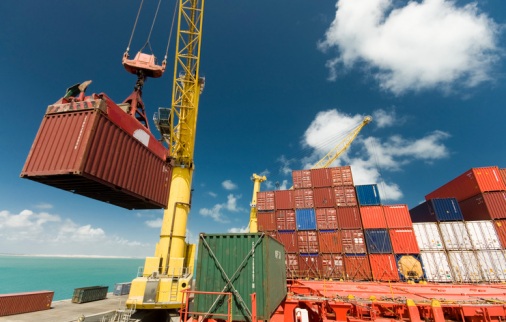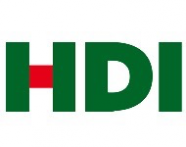Container and shipping shortages: Pandemic effects in global logistics

Pandemic-related disruptions in the normal worldwide flow of goods are resulting in record-high freight charges as well as potentially increasing rates of transport damages. HDI risk analysis experts recommend more communication and coordination up and down supply chains to cope with the current difficulties.
The extreme fluctuations in production demand and manufacturing output that occurred in 2020 as a result of the corona pandemic are now giving rise to a new set of challenges in global container logistics.
- To begin with, the worldwide production shutdowns in the first quarter of 2020 resulted in an overall reduction in active transport capacities.
- In the second and third quarters, East Asian states bounced back from the corona crisis more quickly and were able to ramp up their economies once again, resulting in growing imbalances in the worldwide flow of goods.
- As a result, empty containers have piled up in European and American terminals, while Asian exporters have not had sufficient empty containers available for their shipments.
- Meanwhile industrial companies around the world have sought to replenish their stocks, which were depleted during the first phase of the pandemic, further accentuating disparities in demand and supply of transport capacities.
- Finally, a general rise in e-commerce demand stemming from the pandemic coupled with seasonal effects has increased global shipment needs even more.
Impact on shipping
As 2021 begins, these circumstances have led to a global situation where the demand for container tonnage is now exceeding the available number of ships and containers. The resulting effect: Transport costs for container shipments have increased significantly, while deliveries are being delayed and, in some cases, had to be cancelled.
- Surcharges as high as 5,000 USD per container are being levied in some markets.
- Schedule reliability fell as low as 50 per cent in November on some routes, with continuing delays expected into 2021.
Overall, the availability of shipping capacity and empty containers is in a critical state and is expected to remain so for the next period. These difficulties have been exacerbated by additional hygiene procedures that are necessitated by the risks of Covid-19, particularly for refrigerated containers. The pandemic also caused workforce constraints in many ports, triggering processing delays and congestion at the terminals.
Container quality control and transport damages
A further aspect of the current shortages is an increase in container triangulation – the practice of immediately turning around containers for the next transport directly after emptying.
Often, visual inspection for possible container defects – in accordance with ACEP (Approved Continuous Examination Program) guidelines – is not being performed. As a result, newly occurring defects in container integrity are not being detected and repaired, as they would be with the use of a standardised process of checking and control.
This, in turn, can result in damages to the goods transported in the next use of the containers – most frequently as a result of moisture penetration through undetected holes in the containers. Risk exposure for perishable goods or goods that are sensitive to moisture or corrosion is therefore on the increase.
Vulnerable companies
Companies that work with a large number of suppliers are especially vulnerable to the effects of these various challenges and the overall slowdowns in global logistics. The automobile industry, for example, is particularly affected. Just-in-time deliveries currently entail an increased level of risk for business interruption, especially in connection with international delivery dependencies. To avoid supply disruptions as much as possible, automotive suppliers are building up reserve buffers of parts.
Recommendations from the HDI experts
The experts at HDI Risk Consulting recommend that clients proactively contact their suppliers and forwarders. The goal is to assess current and upcoming transport risks and implement solutions together. Having good communication up and down the supply chain is important for finding ways to cope with the current challenges.
- Companies should establish a good Container Check List and Procedure to sort out inappropriate and damaged boxes from their supply chains and to safeguard that the boxes used serve the needs of the integrity of the cargo they ship to arrive in sound state.
- Companies should be aware of possible delivery delays, particularly in connection with shipments of perishable goods or goods that may be subject to corrosion.
- Companies should also prepare themselves for possible increases in transport times as goods may be redirected to unusual routes.
- The use of track & trace functionality will be increasingly important to avoid unpleasant surprises and to take quick corrective action when necessary.
HDI will be supporting clients as they seek to implement solutions, to analyse risk exposure, and to adjust their insurance as required.
HDI Risk Engineer Lennart Lühn sounds a general warning:
“The current pandemic-related shortages in container availability and transport capacity will be impacting logistics well into 2021. Companies may face additional issues such as unexpected delivery delays as well as higher container freight rates than usual. Proactive attention to those supply chain challenges must be in focus to avoid disturbances/impairments and to prevent resulting losses.
To speak to someone at HDI about this article CLICK HERE, leave a message, and youTalk-insurance will pass your enquiry on.
Authored by HDI Global
About HDI Global SE
Companies from the trading, production and service industries need an insurance partner they can rely on.
As part of the Talanx Group, HDI Global SE has been one of the leading insurers offering a broad and needs-based range of insurance solutions and accompanying services for decades.
HDI operates through foreign branches, subsidiaries and affiliates as well as network partners in more than 150 countries, offering international industrial insurance programmes.

